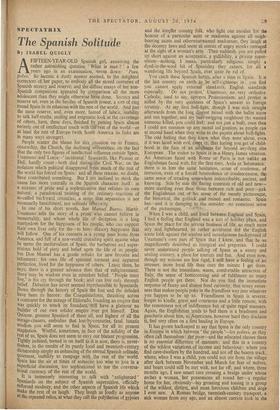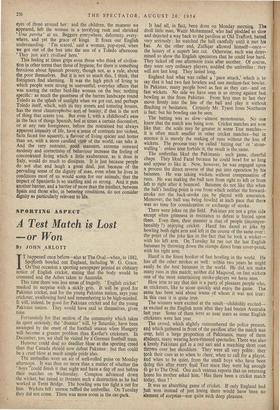SPECTATILIX
The Spanish Solitude
By ISABEL QUIGLY - FIFIEEN-YEAR-OLD Spanish girl, answering the rather astonishing question What is man '? ' a few years ago in an examination, wrote down : Pues, polvo.' So laconic a dusty answer seemed, to the delighted correctors of her paper, to embody all the stored centuries of Spanish secrecy and reserve; and the diffuse essays of her non- Spanish companions appeared by comparison all the more adolescent than they might otherwise have done. Secrecy and reserve set, even in the heyday of Spanish power, a sort of ring round Spain in its relations with the rest of the world. And just the same reserve, and, even more, hatred of labe:s, inability to talk half-truths, smiling and enigmatic look at the cavortings of others, have, these days, finished by putting Spain almost entirely out of intellectual touch with therest of the world—or at least the rest of Europe (with South America its links are in many ways stronger). People scatter the blame for this situation on to Franco, censorship, the Church, the declining universities; on the fact that the only two figures of intellectual influence outside Spain, Unamuno and Lorca—' incidental ' Spaniards, like Picasso or Dali, hardly count—both died during the. Civil War; on the isolation which political disapproval from much of the rest of the world has forced on Spain : and all these reasons, no doubt, have contributed something. But I am inclined to think the cause lies more centrally in the Spanish character itself: in a mixture of pride and a sophistication that relishes its own naiveté; a paradoxical twisting of the ordinary, reactions of so-called backward countries; a sense that separation is not necessarily banishment, nor solitude ufferiority.
In one of his short novels, San Manuel Bueno, Martir, Unamuno tells the story of a priest who cannot believe in immortality, and whose whole life of • deception is a long martyrdom for the happiness of his people, who can support their own lives only for the—to him—illusory happiness that will follow. One of his converts is a young man home from America, and full of a new-world crusading spirit against what he terms the meditevalism of Spain, the barbarous and super- stitious hold 'of piety and belief upon the life of its people; but Don Manuel has a gentle rebuke for new brooms and reformers: his own life of spiritual torment and apparent perfection, lived for the happiness of others. Leave them, he says; there is a greater advance than that of enlightenment; there-may be wisdom even in mistaken belief. People must live,' is his cry through the book; and can live only through belief. Delusion has never seemed reprehensible to Spaniards. Down through the history of Spain the lost and the deluded have been its heroes: the Conquistadores, thrashing across a continent for the mirage of Eldorado, founding an empire that was quickly to wreck its founders, 'still have a glamour no builder of our own solider empire ever got himself. Don Quixote, greatest Spaniard of them all, and highest of all the Mirage-chasers, embodies that lost-by-centuries, fatal, lunatic wisdom you still seem to find in Spain, for all its present stagnation. Wistful, sometimes, in face of the solidity of the rest Of us, Spain does not seem to envy our blatant progression. Tightly isolated, turned in on itself as it is now, there is, never- theless, in the results of its purely local and twentieth-century dictatorship simply an enhancing of the eternal Spanish solitude, quietness, inability to rampage with the rest of the world. Spain has the air at times of someone too wise to join in a superficial discussion, too sophisticated to use the conversa- tional currency of the rest of the world. It is immensely interesting to talk with ' enlightened' Spaniards on the subject of Spanish superstition, officially enforced modesty, and the other aspects of Spanish life which Make the rest of us laugh. They laugh as loudly as anyone at the repeated relics, at what they call the polytheism of gypsies and the simpler country folk, who fight one another for the honour of a particular saint or madonna against all neigh- bouring saints and otherwise-named madonnas; they laugh at the decency laws and sneer at stories of angry monks outraged at the sight of a woman's arm. Then suddenly you are pulled up short against an acceptance, a gullibility, a private super- stition—nothing, I mean, particularly religious, simply a dyed-in-the-wool bit of Spanishry they cannot, for all a wandering life beyond Spain, ever quite be rid of. You catch these Spanish habits, after a time in Spain. It is the last country on earth to be self-righteous in: you find you cannot apply external standards, English standards especially. ' Do not protest,' Unamuno, no very orthodox Catholic, used to say, apropos Protestantism; aid protest is stilled by the very quietness of Spain's answer to foreign scrutiny. At my first bull-tight, though I was sick straight afterwards from the long disgust mixed with the ballet scene and sun together; and my beer-swigging neighbour (he wanted someone killed, you could feel: and not just a bull), even then I could not summon up any moral ind'gnation, as people can at second hand when they write to the papers about bull-fights.
The odd feeling that they knew what they were about, even if it was laced with evil, crept in; that feeling you get of child- hood in the face of an adukness far beyond anything else European. The visitor to Spain is in a Henry James situation. An American faced with Rome or Paris is not unlike an Englishman faced with, for the first time, Avila or Salamanca: there is in him the same hesitation, sense of crudeness, of intrusion, even of a forced benevolence or condescension, the same sense of treading somewhere indescribable, ancient, and knowing. Side by side the flaring contrasts of old and new— more startling even than those between rich and poor—jerk the Englishman out of his sense of the merely picturesque, the historical, the gothick and ruined and romantic. Spain has—and it is damping to the outsider- -no conscious sense of the picturesque.
When I was a child, and lived between England and Spain, I had a feeling that England was a sort of holiday place, and Spain the place for the serious business of life, so much more airy and lighthearted, so rather accidental did the English scene look against the sombre and mountainous background of Unamuno's own part of Spain that I' knew, and That he so magnificently described as liturgical and gregorian. I could never understand people talking of Spain as. a sunny and smiling country, a place for tourists and fun. And even now, though my notions are less rigid, I still have a feeling of an intenser, more local life than ours the minute 1 get there. There is not the immediate, warm, comfortable attraction of Italy, the sense of homecoming and of fulfilment so many English people get there. Nor do you find the immediate response of funny and almost fond curiosity, that nosey sweet- ness that makes people poke in the friendliest way into whatever you happen to be up to. Friendliness in Spain is severer, longer to kindle, grave and courteous and a little remote, with the remoteness not of indifference but of quite regal manners. Again, the Englishman tends to feel there is a brashness and !gaucherie about him, as Americans, however hard they disclaim it, feel very often on a first landing in Europe.
It has grown hackneyed to say tikat Spain is the only country in-Europe in which between the people '—los pobres, as they often call themselves: the poor—and the educated classes there is no essential difference of manners: and this in a country of the wildest variations of income and behaviour: where you find cave-dwellers by the hundred, and not off the beaten track; where, when I was a child, you could not stir from the village after dark between November and March for fear of wolves, and bears could still be met with, not far off; and where, three months ago, I saw smart cars crossing a bridge under whose arches a woman, her possessions all round her—a regular home for her, obviously—lay groaning and tossing in a group of the wildest, dirtiest, and most ferocious children and dogs I ever saw. A Roman bridge. twentieth-century transport, a sick woman from any age, and an almost carrion look in tho eyes of those around her: and the children, the moment we appeared, left the woman in a terrifying rush and shrieked `Una perrita' at us. Beggars everywhere, deformity every- where, and yet the grace of kings. It foxes our English understanding. ` I'm scared,' said a woman, pop-eyed, when we got out of the bus into the sun of a Toledo afternoon. ` They just ain't civilised here.' This feeling at times grips even those who think of civilisa- tion in other terms than those of hygiene; for there is something ferocious about Spanish poverty, though not, as a rule, about the poor themselves. But it is not so much this, I think, that foreigners find alarming. It was the high pitch of living to which people were strung in uneventful, everyday affairs that was scaring the rather bird-like woman on the bus; nothing specific: as much the gauntness of the barren landscape round Toledo as the splash of sunlight when we got out, and perhaps Toledo itself, which, with its tiny streets and tottering houses, has the most claustrophobic sort of beauty, if that is the sort of thing that scares you. But even I, with a childhood's ease in the face of things Spanish, feel at times a certain discomfort, or at any rate foreignness, before the restrained but always apparent intensity of life, have a sense of contrasts too violent, facts faced too squarely, a flavour of living spicier and hotter than we, with a more candied view of the world, can take it. And the very restraint, good manners, extreme outward modesty and correctness of behaviour increase the feeling of concentrated living which a little exuberance, as it does in Italy, would do much to dissipate. It is just because people do not chat and laugh a great deal, just because of the pervading sense of the dignity of man, even when he lives in conditions most of us would scorn for our animals, that the impact of Spaniards is so startling and so strong. And it puts another barrier, and a barrier of more than the intellect, between Spain and those who, in bettering conditions, do not consider dignity as particularly relevant to life.



































 Previous page
Previous page